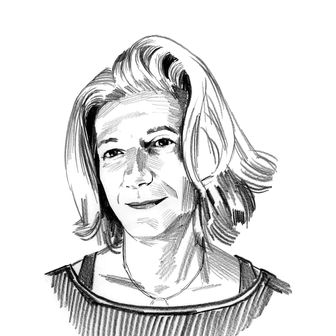
Into the midst of this national conversation on women’s truth, women’s stories, and the epochs-long, socially accepted, widely condoned subordination of women, comes Pure: Inside the Evangelical Movement That Shamed a Generation of Women and How I Broke Free, out today from Touchstone Books. And apart from its obscure, ominous-romantic cover design (a faceless woman with blowing hair standing in what might be a desert: what?), Linda Kay Klein’s book about the devastating effects of Christianity’s obsession with purity culture is a revelation.
Part memoir and part journalism, Pure is a horrendous, granular, relentless, emotionally true account of how it feels to be taught — by parents, neighbors, teachers. and pastors — from the youngest age that one’s sexuality (including organs, physical body, and sexual impulses) is disgusting, a mind-set that can lead to only one place: that deep inside, the girl is disgusting, too.
Popular writing about conservative religion, especially by secular authors, is often cliché: it either discounts the complex experiences of the real people living within religious bounds or naïvely seems to “discover” religious subcultures that have existed for years. Klein defies these categories. She is not a secular outsider, calling out the sexual abuse and subordination of women in the Evangelical world with the condescension and shock of one who “knows better.” She is an insider who has, through much anguish, shed the damaging constraints of her upbringing.
Klein began to see how her Christian upbringing messed her up in college, when she failed to visit a doctor after years of severe stomach pain and bleeding, believing that it was her Christian job to endure suffering. She was ill, it turned out, with Crohn’s disease. Once she saw how her demented thinking nearly killed her, she started to ask questions of other girls and women who were raised as she was. She asked her questions first out of curiosity and a need for solidarity. Then, the stronger Klein grew in her conviction that her generation’s whole mind-set around sex and self was twisted and damaging, the more her curiosity grew into a drive — or as she puts it, religiously, a “calling.” Pure is the result of that awakening.
I have been covering American religion as a journalist for decades now, and have spent a lot of time in the subcultures that Klein describes. I have accompanied an Evangelical publicist to Victoria’s Secret for naughty underwear because that night she and her husband were “planning to make a baby,” but I have never seen anywhere a more intimate and heart-rending description of what it’s like to be 14 or 15 or 20 years old living under the expectations Evangelicals have about “purity” — sexlessness, including virginity before marriage — and its antithesis. After marriage, a Christian girl, who has been guarding her purity as a full-time job while wondering alone in her bedroom what “counts” as sex — kissing? touching? masturbating? flirting? dating? blow jobs? — without any explicit guidance from teachers, counselors, or parents, is expected to turn into a accommodating tigress in bed. “Somehow,” Klein writes, “purity culture has turned a pornographic fantasy about a virgin turned vamp into ‘morality,’ so that now both a woman’s nonsexuality before marriage and her hypersexuality after marriage are required for her to be considered good.”
With intimacy and sympathy, Klein tells stories that make your skin crawl: Of Christian youth pastors who teach about the filth of the human condition by making kids drink Mountain Dew and eat Tootsie rolls out of a baby potty; of kids passing around a lollipop and spitting or sucking on it in turn, and at the end being told that this “used” candy was like a girl who had given her virginity away; of a girl who discovered that if she slapped her own vulva repeatedly whenever she became aroused she could make the tingling feeling go away; of a teenager who, after being raped by her brother, found that her parents sided with him; of lesbians and trans people sent to “conversion” therapists; of young marrieds who had no idea how to make sex actually work — a situation that went on for decades; of woman after woman after woman who, after (or in the midst of) finally having sex, crumpled into a helpless ball of anxiety and shame.
So fearful was Klein of the censure of her community, which she had internalized, that every time she so much as touched a man, she self-administered a pregnancy test. She was a virgin. She knew how babies were made. But “I couldn’t help but anticipate the terrible consequences that I felt would undoubtedly follow” sex, she writes. “Surely something terrible was about to happen to me. Some terror was about to arise … My irrational fear could only be quelled with a store-bought test.” Sex panic was as normal as breathing. Klein’s mother begged her not to write the book, fearing that her daughter’s determination to tell the truth was in fact a plan by Satan to claim her soul — and the souls of every sympathetic reader. “What if people turn away from God because of what you say the church did!,” her mother says in despair. “Those people will go to Hell. Which is a lot worse than whatever is happening to you and your friends.”
There will be readers who are tempted to place Pure atop their pile of outrage porn, to tweet and blog about its revelations as more evidence of the hegemony of patriarchy and the oppressions levied upon women — this time by organized religion. They won’t be wrong.
But for me, the value of this book is in its gentle and sympathetic descriptions of how a girl learns to absorb the lessons of her oppressive culture and to internalize them. “Learn” is even the wrong word here: She swims in the water of her own subordination. Her degradation is a constant, normal aspect of her life.
Which is something I’ve been thinking about this long, awful year. For me, the residual effects of #MeToo have not been related to individual instances of sexual violence or harassment or domination, as awful as they are, but in the much subtler, widespread way that women — all women — are raised in some degree to be invested in the dominance of men, to the point where they don’t trust themselves to discern or evaluate their own sense of right. This second-guessing, this gaslighting of a whole gender in order to preserve the way things are, is familiar to any woman who’s wondered if she’s smart enough to talk at the meeting, or who berates herself in the middle of the night for something stupid she said, or who frets ceaselessly over the way her eyebrows or her ankles or her ass are perceived. The quiet internalization of inferiority is as common as dirt, and Pure is evidence of that.





